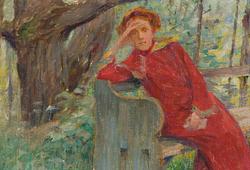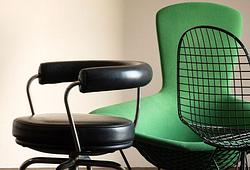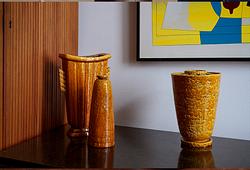Lin Fengmian
Owl
Signerad samt med konstnärens sigill. Tusch och färg på papper. 38,9 x 35,5 cm.
Monterad på kartong.
Proveniens
Acquired directly from the artist, in Shanghai 1963, by Dutch Ambassador Roland van den Berg, and later the same year given to his sister Saskia Ramel and her Husband Henrik Ramel, thence by descent.
Litteratur
Compare with a similar painting sold at Sotheby's, Hong Kong, 27th May, 2013, Lot 1062.
Övrig information
Lin Fengmian was born 1900 in Meixian, Guandong province. In 1919 he moved to Shanghai and joined a work-study program. In 1920 he left for France, to study art at Ecole Supérieure des Beaux Arts in Dijon. Soon his extraordinary talent was recognized, and he moved to the studio of Fernand Cormon at Ecole des Beaux Arts in Paris. While in Paris Lin Fengmian spent several hours at museums, studying western art, but also made intense studies of the collection of Chinese art and works of art at the Musée Guimet. 1926 he returned to China, to the newly established art academy in Beijing, where he organized the groundbreaking Beiping Art Convention. In 1927, driven out by warlords, he went to Ministry of Education in Nanjing, at invitation by Cai Yuanpai. Cai appointed him first director of the newly established Hangzhou Acadamy in 1928, where he set out, in his own words "to introduce Western art, reorganize Chinese art, combine Chinese and Western art and create an art for this epoch". After the Second World war, when the academy first had moved to Kunming and later to Chongqing, it returned in 1946 to Hangzhou. in 1952 Lin Fengmian was ousted as director, and his life became thereafter increasingly difficult. His family left for Brazil in 1955, while he stayed in China and later suffered severely in the Cultural revolution, at what time he also destroyed much of his work. in 1977, he went to Hong Kong, where he lived in deep seclusion, only gradually emerging to enjoy his last years of fame and recognition as a key figure in the introduction and adaption of Western modernism into modern Chinese art. Many of his pupils became leading figures in the modern movement, including Zao Wuji (Zao Wou-ki), Wu Guanzhong, Li Keran, and Zhu Dequn. In 2000 Lin Fengmian was the subject of a major exhibition in Beijing.





























